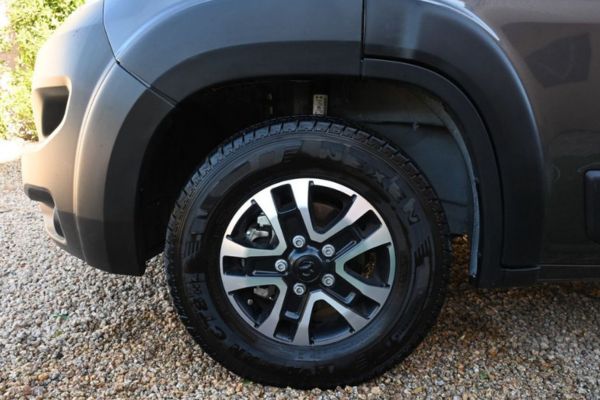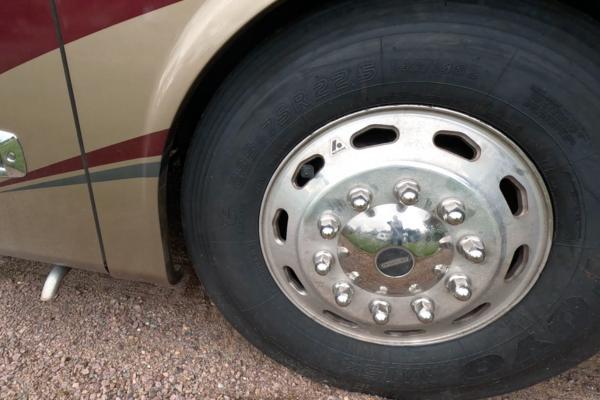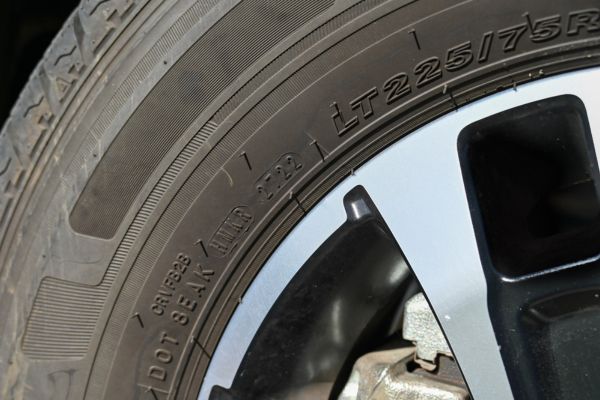
Living in or owning a home on wheels, such as a recreational vehicle (RV), can be a thrilling and adventurous experience. The freedom to travel wherever your heart desires while still having the comfort of a cozy home is indeed wonderful. However, amidst all the excitement, it is crucial to prioritize safety, and one aspect that requires special attention is the wheels themselves.
Neglecting tire maintenance can lead to dangerous situations on the road and costly repairs.
Here are some essential tire safety tips to remember while RVing to keep you and your fellow travelers safe.

Regularly Inspect Your Tires
Before each trip, thoroughly inspect your RV’s tires for signs of damage, such as cuts, bulges, or uneven wear. Check the tire pressure using a reliable gauge, keeping it at the manufacturer’s recommended level. Properly inflated tires ensure optimal handling, longevity, and even fuel efficiency.
The maximum recommended tire pressures for your RV are listed on the certification label or in your owner’s manual. Always follow the RV manufacturer’s recommended tire pressure because it’s unique to your motorhome or trailer and can vary from axle to axle.
Don’t Overload Your RV
Excessive load can lead to tire blowouts and decreased overall performance. Before hitting the road, make sure you understand and adhere to the weight limits specified by your RV manufacturer. Distribute the load evenly to avoid putting excessive weight on one or more axles (end-to-end imbalance).
For detailed load measurements, weigh your loaded RV to determine the weight distribution across all four corners of your vehicle. This process can provide valuable insight into how your RV is loaded and if adjustments need to be made to ensure safe and optimal performance on the road.
Want to have your RV weighed at the next FMCA event? Check out the FMCA events page to see what’s happening near you.
By obtaining detailed weight measurements, RV owners can make informed decisions about properly distributing their cargo and avoiding potential safety issues.
Rotate Tires Regularly
Due to the weight distribution of an RV, tires tend to wear irregularly. To promote even wear, have your tires rotated regularly. This practice helps extend their lifespan and ensures a smooth ride.
Tire life and wear are different for motorhomes and trailers. Since trailer tires are dragged around every turn, the motion places a high internal structural load on the radial belts. These forces can shorten tire life in trailers by 50%.
Check Tire Age
Tires deteriorate over time, even in storage. Look for the DOT code on the sidewall to determine the age of your tires. This code indicates the week and year of production.

Tire life differs depending on where you live or store your RV. If you live or store your RV in the southern section of the United States, your tires will have half the life of those kept in the cooler climates of the northern U.S. and Canada.
Towing an RV? Tire experts recommend replacing your trailer tires even more frequently than you’d replace motorhome tires.
The lifespan of trailer tires is approximately 50% less than motorhome tires. In the northern states and Canada, you should replace trailer tires every three to four years, and in the hotter southern section of the U.S., expect to replace your tires even sooner — every two or three years.
Maintain Proper Speed
Maintaining proper speed while you’re driving or towing an RV is crucial for tire safety because driving at high speeds generates excessive heat within the tires, which can lead to premature wear, increased risk of blowouts, and potential tire failure, significantly impacting the lifespan and safety of your RV tires; essentially, exceeding the recommended speed for your tires puts undue stress on them, making them more prone to damage.
Invest in a Tire Pressure Monitoring System
Consider installing a Tire Pressure Monitoring System (TPMS) on your RV. A TPMS continuously monitors tire pressure and temperature, providing real-time alerts if any issues arise.
TPMS systems work by using small electric sensors attached to each wheel to monitor tire pressure. When the pressure in one or more tires changes, the TPMS will display a warning light on your dashboard. A TPMS enhances your overall safety by detecting potential tire problems before they cause accidents.
Practice Careful Parking
When parking your RV, avoid steep or sharp curbs that can cause damage to your tires. Park on level surfaces whenever possible to alleviate uneven stress on your tires.
Be Mindful of Environmental Factors
Extreme temperatures, exposure to the sun’s UV rays, and long periods of inactivity can all impact your tires. Protect your tires by using covers and parking in shaded areas whenever your RV is not in use.
Be Prepared for Emergencies
Even with proper tire maintenance, emergencies can occur. Always carry a spare tire and the necessary tools to change a flat. Familiarize yourself with the tire-changing procedure specific to your RV.
Seek Professional Help
If you notice any concerning signs, such as severe damage, persistent inflation problems, or vibrations, seek help from a qualified tire professional or an RV service center. They can provide accurate assessments and recommendations for resolving any tire-related issues.
Bonus: Budget for Tire Maintenance and Repair
Lastly, as a bonus tip, budgeting for tire maintenance is crucial. While RVing offers a sense of freedom and flexibility, it is also important to allocate a portion of your funds for tire-related expenses. Regular inspections, alignment checks, and tire replacements should be factored into your overall travel budget, as these preventive measures can save you from unforeseen breakdowns down the road.
Did you know tire discounts are one of the perks of an FMCA membership? Join FMCA to use the discount tire program and save money when your RV needs new tires.
Safe Travels
By following these top tips for tire safety while RVing, you’ll have peace of mind knowing that your tires are in optimal condition for your adventures on the road. Prioritizing tire maintenance and safety helps prevent accidents and ensures a smoother and more enjoyable RVing journey. So, pack up, buckle in, and hit the road with confidence and tire safety in mind. Safe travels.
Related Reading
RV Living Costs: Unraveling the True Expenses of Living Full-Time on the Road
In Search of Big-Rig Friendly Campgrounds
The Art of Date Nights: Love in 300 Square Feet
|
Chasing Our Sunshine Joel, Deb & Maya. |


 We are a full-time RV couple who recently retired from law enforcement, downsized and sold almost everything, and have been traveling full-time since October 2021. We share our adventures as we learn about RV life & cover RV travels, finance, DIY RV projects, destination reviews, and other RV living details. We hope you join us as we document our adventures
We are a full-time RV couple who recently retired from law enforcement, downsized and sold almost everything, and have been traveling full-time since October 2021. We share our adventures as we learn about RV life & cover RV travels, finance, DIY RV projects, destination reviews, and other RV living details. We hope you join us as we document our adventures
Great article from awesome people.